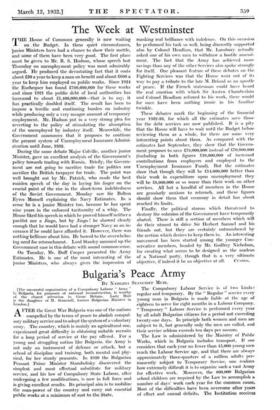The Week at Westminster
V IHE House of Commons generally is now waiting on the Budget. In these quiet circumstances, junior Ministers have had a chance to show their mettle, and some of them have been very good. The first place must be given to Mr. R. S. Hudson, whose speech last Thursday on unemployment policy was most admirably argued. He produced the devastating fact that it costs about £80 a year to keep a man on benefit and about £600 a year to.keep him employed on public works. Since 1924 the Exchequer has found £700,000,000 for these works arid since 1921 the public debt of local authorities has increased to about £1,400,000,000—that is to say, it has practically doubled itself. The result has been to impose a terrific and continuing burden on industry while producing only a very meagre amount of temporary employment. Mr. Hudson put in a very strong plea for reverting to the policy of stimulating the absorption of the unemployed by industry itself. Meanwhile, the Government announces that it proposes to continue the present system of Unemployment Insurance Admini- stration until June, 1933.
During the same debate Major Colville, another junior Minister, gave an excellent analysis of the Governthent's policy towards trading with Russia. Briefly, the Govern- ment are not going to sacrifice trade for politics nor sacrifice the British taxpayer for trade. The point was well brought out by Mr. Patrick, who made the best maiden speech of the day in laying his finger on the crucial point of the rise in the short-term indebtedness of the Soviet Government. Monday saw Sir Bolton Eyres Monsen explaining the Navy Estimates. In a sense he is a junior Minister too, because he has spent nine years in the enforced taciturnity of a whip. The House liked his speech in which he proved himself neither a pacifist nor a Jingo, but by Jingo ! he showed clearly enough that he would have had a stronger Navy as an in- surance if he could have afforded it. However, there was nothing' ellicose about him. He bowed to the overwhelm- ing need for retrenchment. Lord Stanley summed up the Government case in this debate with sound common sense.
On Tuesday, Mr. Duff Cooper presented the Army Estimates. He is one of the most interesting of the junior 'Ministers, who always gives the impression of
masking real brilliance with indolence. On this occasion he performed his task so well, being discreetly supported also by Colonel Hendlam, that Mr. Lansbury actually asked one of his own men to withdraw a hostile amend- ment. The fact that the Army has achieved mom savings than any of the other Services also spoke strongly for itself. One pleasant feature of these debates on the Fighting Services was that the House went out of its way to pay a tribute to the late M. Briand as an apostle of peace. If the French statesman could have heard the real emotion with which Sir Austen Chamberlain and Colonel Headlam referred to his work, there would for once have been nothing ironic in his familiar twinkle.
These debates mark the beginning of the financial year 1932-33, for which all the estimates save those for the debt services are now published. It is a pity that the House will have to wait until the Budget before reviewing them as a whole, for there are some very interesting points about them. As compared with the estimates last September, they show that the Govern- ment proposes to save £78,000,000 instead of £70,000,000 (including in both figures £10,000,000 of increased contributions from employers and employed to the Unemployment Insurance Fund). But the estimates show that though they will be £14,000,000 better than their work in expenditure upon unemployment they will be £6,000,000 or so worse than their work on other services. All but a handful of members in the House are genuinely anxious to retrench, and these figures should show them that economy in detail has about reached its limits.
Finally, the political storms which threatened to destroy the cohesion of the Government have temporarily abated. There is still a section of members which will do their utmost to drive Sir Herbert Samuel and his friends out, but they are certainly outnumbered by the section which desires to keep them in. An interesting movement has been started among the younger Con- servative members, headed by Mr. Godfrey Nicholson, for creating what seems to be designed as the nucleus of a National party, though that is a very ultimate objective, if indeed it be an objective at all. CUSTOS.


















































 Previous page
Previous page